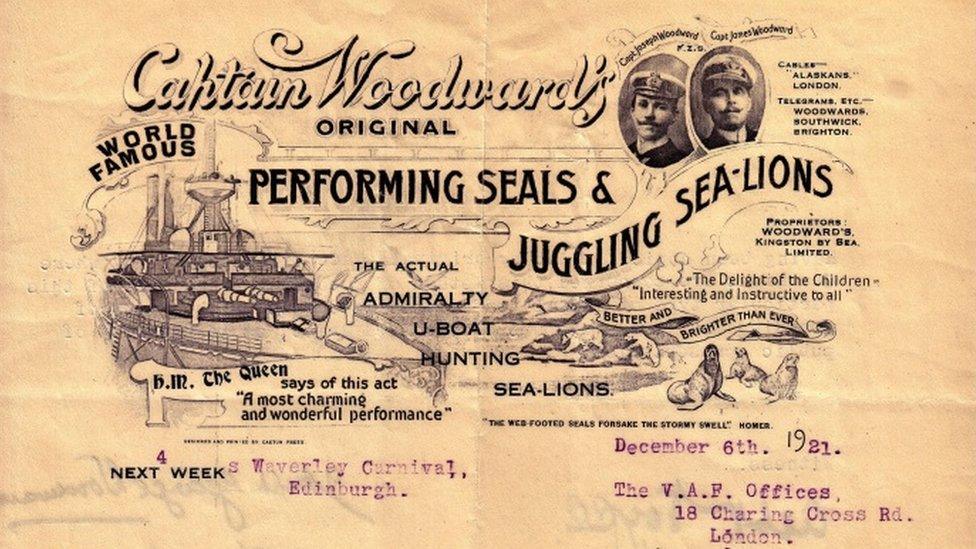U-boat hunting sea lions feature in BBC WW1 e-book
- Published

British commanders commissioned a popular showman to train his performing sea lions to detect and follow submarines
A doomed plot to train sea lions to track German U-boats during World War One is highlighted in a new e-book published by the BBC.
The free online compendium brings together hundreds of stories from the home front, including archive films, audio clips, photographs and documents from the Imperial War Museums (IWM).
In 1916, German U-boats were a growing menace to the British war effort. Hundreds of thousands of tons of merchant shipping were being sunk every month and the Admiralty's Board of Invention and Research was eager for innovative solutions.
In their desperation, British commanders turned to the world of music hall and circus entertainers. They commissioned a popular showman to train his performing sea lions to detect and follow submarines.
Joseph Woodward and his family were the first people to display sea lions as popular entertainment. He contacted the Admiralty with the suggestion that sea lions might detect the underwater sound of a U-boat, swim to the enemy vessel and signal its location.
In echoes of the famous experiment conducted by Pavlov with his dogs, the aim was to muzzle sea lions before feeding and get them to respond to sounds underwater, while ignoring the fish around them.
Initial trials in a swimming pool in Westminster and then at Lake Bala in Gwynedd were promising.
But when the animals were put to the real test in the open water of the Solent the flaws in the experiment quickly became apparent.
Two sea lions were tasked with chasing a Royal Navy submarine but they were easily distracted by shoals of fish and absconded for hours at a time.
In the summer of 1917 the experiment was abandoned but, ever the self publicist, its failure did not prevent Mr Woodward later promoting his act as featuring "The Actual Admiralty U-boat Hunting Sea-Lions".

The story of Woodward's sea lions forms part of the digital compilation, World War One at Home, which was collated in collaboration with the IWM following the success of the BBC's campaign last year which marked its centenary.
It will help keep alive the memories of those who lived through some of the country's most challenging years, said the IWM.
"This book is a tribute to those who fought, struggled and triumphed in this great conflict," added Craig Henderson, executive editor at the BBC.
"We hope it preserves some of the memories of those whose lives were caught up in extraordinary events and who sacrificed so much."
Details of how to download the e-book are available on the BBC's World War One site., external